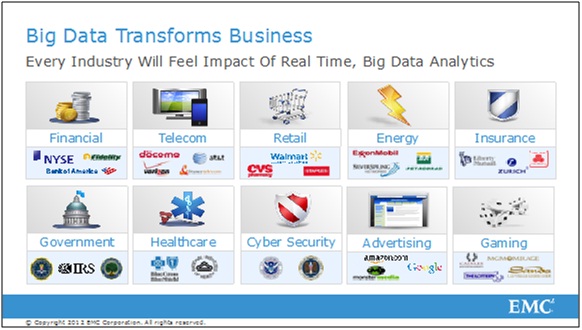During his opening EMC World keynote presentation, Joe Tucci talked about how enterprise information is dwarfed by data being created in the “digital universe” – outside the four walls of the organization. According to the IDC Digital Universe study sponsored by EMC, this data is growing at an astounding rate of more than 5,000 petabytes per day, and 80% of it is non-enterprise generated.
 We also heard at the Data Science Summit that leading organizations are aggressively enhancing their enterprise information (structured ERP, CRM, POS data and unstructured consumer comments, emails, physician notes, claims descriptions) with information in the digital universe (social media, mobile, and machine-generated data) to create new products and services for their customers.
We also heard at the Data Science Summit that leading organizations are aggressively enhancing their enterprise information (structured ERP, CRM, POS data and unstructured consumer comments, emails, physician notes, claims descriptions) with information in the digital universe (social media, mobile, and machine-generated data) to create new products and services for their customers.
What really caught my attention was that while enterprise information provides an “internal” perspective on the business, the digital universe information provides an “outside-in” perspective on the business. Integrating enterprise information with the digital universe information provides unique, and in many cases higher-fidelity insights about your customers, products, markets, and competitors that can materially improve the organization’s value creation processes.
Digital Universe Data And An Outside-In Perspective On The Business
The Digital Universe information can also provide new insights into your internal operations to ensure that you are focused on building the right core competencies; that is, those competencies that drive business value and competitive advantage. Why optimize internal processes that have no value to your customers, partners, or markets?
The table below highlights some of the differences enabled between enterprise information and digital universe information.
| Enterprise Information | Digital Universe Information |
| Inside-out perspective | Outside-in perspective |
| React to market opportunities | Create market opportunities |
| Quick follower | First mover |
| Marginal improvements (5%) | Magnitude improvements (5x) |
| Data management | Data monetization |
The Digital Universe Information Challenges
Working with digital universe information poses some unique and difficult data management and analytic challenges, including:
- Separating the information from the noise. There is lots of data being generated in the digital universe, but the vast majority of that data is only noise. Considerable thought and effort will be required in identifying which of that data is actually usable.
- Getting comfortable with working with “good enough” data. The digital universe information contains lots of sporadic, incomplete, and sometimes inaccurate activities. But even within this “flawed” information, there are lots of valuable insights about your customers and market trends that can be monetized or help to make better business decisions.
- Identifying the metrics that are the best predictors of performance. Building off of the “Moneyball” learnings, the digital universe information is a rich source of new metrics, only some of which will be better predictors of performance. Understanding your organization’s business initiatives will be key in determining which of these new metrics will actually be better predictors of performance.
- Beware of false positives. Statistical models come with natural modeling biases (Type I and Type II errors). We need to help the business users understand the impact of these Type I and Type II errors on their business decisions. One cannot just make decisions blindly off of the analytic models without giving consideration to what’s reasonable from a business, or human, perspective.
Summary
Information outside the enterprise in the digital universe holds the potential to transform how companies analyze and value their businesses. Digital universe information yields insights on customers, partners, products, markets, and competitors that just cannot be gleaned from internal data sources. And this information can change the very nature of how companies and industries compete.
 Digital universe information provides invaluable insights into your customers’ interests, passions, affiliations, and associations that can dramatically improve your customer acquisition, maturation, and retention lifecycle. It provides measurable insights on partners’ performance and behavioral trends that can improve your supply chain and inventory effectiveness. And it provides actionable insights on market trends and directions, and competitors’ behaviors and tendencies that can be used to drive competitive advantage.
Digital universe information provides invaluable insights into your customers’ interests, passions, affiliations, and associations that can dramatically improve your customer acquisition, maturation, and retention lifecycle. It provides measurable insights on partners’ performance and behavioral trends that can improve your supply chain and inventory effectiveness. And it provides actionable insights on market trends and directions, and competitors’ behaviors and tendencies that can be used to drive competitive advantage.
